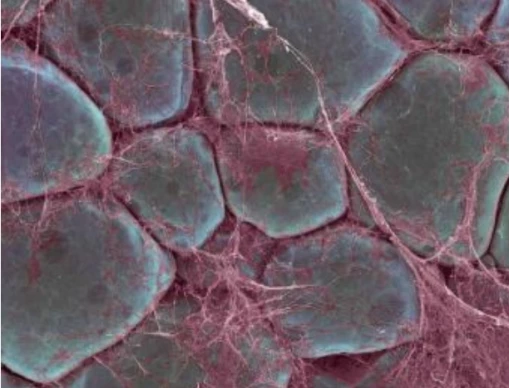Studies reveal that the maintenance of adult adipose tissue homeostasis

Studies reveal that the maintenance of adult adipose tissue homeostasis

Copyright © iCell Bioscience Inc, Shanghai 2018-2019
Fat not only acts as an energy storage organ, but also plays an important role in the regulation of the body's metabolism as endocrine tissue. Unbalanced regulation of fat homeostasis, such as obesity or lipodystrophy, will lead to severe metabolic abnormalities and disease. Adult adipose tissue is not static, and its fat cells are in constant replacement.
Adipose precursor cells in the adipose tissue vascular matrix continue to differentiate to form new adipocytes. Like other adult tissue stem cells and precursor cells, fat precursor cells are regulated by the microenvironment signals they are in, but the key microenvironmental signals and their regulatory mechanisms that regulate the fat precursor cells in the adult stage remain to be elucidated.
On August 6th, the international academic journal PLOS Biology published the latest research results of the FG1-positive fibroblasts are adipogenic niche and regulate adipose homeostasis, which revealed the adult adipose tissue. Steady state maintains key microenvironmental factors.

It was found that FSP1-positive fibroblasts in the vascular matrix of mouse adipose tissue act as microenvironment factors of adipose precursor cells to regulate the replacement process of adipocytes in adult stage, and abnormal signal and function lead to disorder of fat homeostasis in adult stage.
FSP1-positive fibroblasts do not express molecular markers of adipose precursor cells, nor can they differentiate into adipocytes in vivo or in vitro. Elimination of FSP1-positive fibroblasts or activation of the canonical Wnt signaling pathway in FSP1-positive fibroblasts results in decreased body fat levels in adult mice and resistance to high-fat-induced obesity.
The study found that FSP1-positive fibroblasts promote self-renewal of adipose precursor cells through PDGF signaling and maintain their differentiation potential by remodeling the extracellular matrix microenvironment; PDGFR not only serves as a marker of fat precursor cells, but also before fat The number of somatic cells maintains and plays an important regulatory role in the differentiation process.
This work will help to further understand the maintenance of the homeostasis of adult adipose tissue, its mechanisms leading to metabolic abnormalities, metabolic diseases, and new intervention targets for metabolic diseases such as obesity.
 Loading ....
Loading ....
